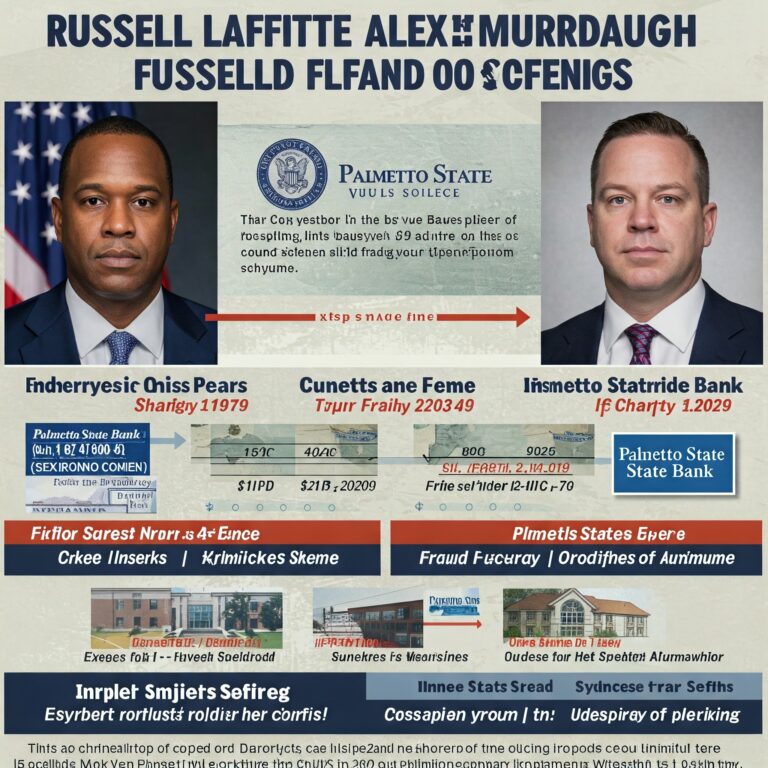CHARLESTON, S.C. — — In a significant development in the sprawling financial saga connected to convicted murderer Alex Murdaugh, former Palmetto State Bank (PSB) Chief Executive Officer Russell Lucius Laffitte, 54, of Estill, South Carolina, pleaded guilty today in federal court to orchestrating a years-long scheme with Murdaugh to defraud vulnerable clients and misuse bank funds. Laffitte entered guilty pleas to six federal felony counts: conspiracy to commit wire fraud and bank fraud; wire fraud; bank fraud; and three counts of misapplication of bank funds.
The plea, entered before United States District Judge Richard M. Gergel, marks a pivotal moment, bringing Laffitte’s protracted legal battle towards a conclusion and solidifying his role as a key enabler in Murdaugh’s extensive financial crimes. Under the terms of a plea agreement, Laffitte has agreed to pay over $3.5 million in restitution to victims before his sentencing and faces a potential five-year prison term.
“Russell Laffitte and Alex Murdaugh abused their positions of power to victimize people who trusted them,” stated Ben Garner, Chief of the U.S. Attorney’s Office Criminal Division. “As of today, both have pleaded guilty and accepted responsibility for their crimes in federal court. We appreciate the exhaustive work of our partners at the FBI, SLED, and South Carolina Attorney General’s Office to ensure justice for Laffitte and Murdaugh’s victims”.
This guilty plea averts a scheduled retrial for Laffitte, whose November 2022 conviction on the same six charges was overturned by the U.S. Fourth Circuit Court of Appeals in late 2024 due to procedural errors during jury deliberations.
The Banker, The Lawyer, and The Bank: A Tangled History
Russell Laffitte’s admission of guilt adds another chapter to the downfall of two once-prominent Hampton County families. The Laffitte family has been synonymous with Palmetto State Bank since acquiring it (then the Loan and Exchange Bank) in 1955 and renaming it in 1970. Founded in 1907, PSB grew alongside the Murdaugh legal dynasty, whose patriarch Randolph Murdaugh Sr. established his law firm (later known as PMPED, now Parker Law Group ) in Hampton just three years later, in 1910. For generations, the Laffittes in banking and the Murdaughs in law wielded significant influence in the South Carolina Lowcountry.
Russell Laffitte followed his father, Charles “Charlie” Laffitte Jr., into the family business, eventually becoming CEO. He was deeply enmeshed in the community, serving as Vice Chairman of the Hampton County Disabilities and Special Needs Board and even being named “Independent Banker of the Year” by the Independent Banks of South Carolina in 2019 – an accolade now starkly contrasted with his admitted criminal conduct.
His relationship with Richard Alexander “Alex” Murdaugh, a fourth-generation lawyer at PMPED and part-time prosecutor , stretched back decades to childhood. It was this deep-seated familiarity and trust, prosecutors argued and Laffitte now effectively concedes, that Murdaugh exploited and manipulated to facilitate his complex financial crimes. Laffitte himself, in an earlier interview, acknowledged Murdaugh’s manipulative skills and how their long-standing relationship made him less likely to question Murdaugh’s requests.
The Conspiracy: Exploiting Trust and Conservatorships
The core of the conspiracy, which Laffitte admitted began around 2011, involved exploiting his position at PSB and his role as a court-appointed conservator and personal representative for Murdaugh’s personal injury clients. A conservator is appointed by a court to manage the financial estate of a “protected person,” often a minor or incapacitated adult, who cannot manage their own affairs. This role carries a strict fiduciary duty – the highest legal obligation to act solely in the best interest of the protected person, with undivided loyalty and prudence, avoiding any self-dealing or conflicts of interest.
Laffitte admitted he agreed to serve in this capacity for several of Murdaugh’s clients, knowing he would personally profit through fees. These clients were often uniquely vulnerable – minors who had lost parents, individuals with severe injuries, or those lacking financial sophistication.
The scheme unfolded through several mechanisms:
- Improper Loans from Conservator Accounts: Starting in 2011, Laffitte began extending personal loans to himself (totaling $355,000 according to trial evidence ) and to Alex Murdaugh (totaling $990,000 per trial evidence , or approximately $960,000 per appellate documents ) directly from the conservatorship accounts he managed. Crucially, Laffitte admitted he failed to disclose these loans to the conservatees, breaching his fiduciary duty. Murdaugh often used these funds to cover massive overdrafts in his personal accounts at PSB.
- Diverting Client Settlement Funds: Murdaugh devised a method to siphon settlement money belonging to his clients. He directed employees at his law firm to make settlement checks payable directly to “Palmetto State Bank” rather than to the clients or the firm’s trust account. These checks, often identifying the client on the memo line and matching disbursement sheets Laffitte saw, were then presented to Laffitte.
- Negotiating Checks for Murdaugh’s Benefit: Knowing the funds belonged to the clients, Laffitte negotiated these checks as directed by Murdaugh, diverting the money for Murdaugh’s personal use. This included repaying the improper loans Laffitte had extended from the conservator accounts, purchasing vehicles and equipment, and providing cash back to Murdaugh. In total, Laffitte and Murdaugh were alleged to have stolen nearly $2 million from settlement accounts through these methods.
Laffitte specifically admitted to negotiating nine separate transactions for Murdaugh’s benefit involving funds belonging to two clients for whom he served as conservator. For a third client (identified in other documents as the estate of Donna Badger ), Laffitte admitted negotiating 12 transactions, disbursing a staggering $1,325,000 in settlement funds for Murdaugh’s personal benefit.
Misapplication of Bank Funds: A Pattern of Abuse
Beyond the conspiracy involving client funds, Laffitte pleaded guilty to three distinct counts of misapplication of bank funds under 18 U.S.C. § 656. This federal crime occurs when a bank officer or employee willfully misuses or wrongfully applies bank monies or credits with the intent to injure or defraud the bank. Laffitte admitted to the following acts:
- Misuse of Farming Line of Credit (2015): Laffitte misapplied over $284,000 from a line of credit designated for farming purposes. Instead, he used these bank funds to repay Murdaugh’s outstanding improper loans drawn from the conservatorship accounts.
- Fraudulent Loan for “Beach House Renovations” (July 2021): Laffitte extended a $750,000 commercial loan to Murdaugh, ostensibly for renovations on a beach house. However, Laffitte knew the loan was essentially unsecured and the stated purpose was false. He authorized a $350,000 wire transfer from the loan proceeds directly to another attorney (likely related to settling a separate theft by Murdaugh) and transferred the remaining $400,000 to Murdaugh’s personal account primarily to cover over $367,000 in overdrafts.
- Unauthorized Payment to Law Firm (October 2021): After Murdaugh’s law firm (then PMPED) uncovered evidence of his theft from clients in September 2021 and confronted him, they also discovered Laffitte’s role in negotiating stolen checks. Knowing he was implicated, Laffitte made a payment of $680,000 in Palmetto State Bank funds to the law firm in an attempt to settle the matter and conceal his involvement. Laffitte admitted he made this payment without the knowledge or consent of the full PSB Board of Directors or Executive Committee.
Concealment: Tax Evasion and Structuring
Laffitte’s criminal conduct extended to efforts to conceal his gains and activities. He admitted receiving $75,000 in conservator fees and $35,000 in personal representative fees related to the three clients whose funds were extensively misappropriated – a total of $110,000. He intentionally failed to report this income on his personal tax returns. Laffitte knew he could hide this income because the fee checks were deliberately drafted payable to Palmetto State Bank rather than to him personally.
Furthermore, Laffitte admitted to structuring transactions to avoid federal reporting requirements. Structuring involves intentionally breaking down large cash transactions into multiple smaller deposits or withdrawals, each below the $10,000 threshold that triggers a Currency Transaction Report (CTR) filing by the bank under the Bank Secrecy Act. This is often done to conceal the source or movement of funds. Laffitte also admitted he intentionally failed to file Suspicious Activity Reports (SARs) as required by law when encountering transactions indicative of potential illegal activity.
Understanding the Charges
Laffitte pleaded guilty to a complex set of federal financial crimes. Here’s a brief explanation of each:
- Conspiracy (18 U.S.C. § 371 / § 1349): An agreement between two or more individuals (Laffitte and Murdaugh) to commit another federal crime (in this case, wire and bank fraud), coupled with at least one overt act taken by a conspirator to further the agreement. The agreement itself, plus an action towards its goal, constitutes the crime.
- Wire Fraud (18 U.S.C. § 1343): Knowingly devising or participating in a scheme to defraud someone of money or property using interstate wire communications (like electronic funds transfers, internet banking, potentially phone calls or emails related to the scheme).
- Bank Fraud (18 U.S.C. § 1344): Knowingly executing or attempting a scheme to defraud a financial institution (Palmetto State Bank) or obtain its money/property through false or fraudulent pretenses, representations, or promises.
- Misapplication of Bank Funds (18 U.S.C. § 656): The willful and unlawful misuse of a bank’s funds or credits by an officer, director, agent, or employee with the intent to injure or defraud the bank. This applied to Laffitte’s improper loans and unauthorized payments using PSB money.
Table 1: Summary of Charges Admitted by Russell Laffitte
| Charge | Brief Description |
|---|---|
| Conspiracy to Commit Wire Fraud & Bank Fraud | Agreement with Alex Murdaugh to unlawfully obtain money/property from clients and PSB using interstate wires and deceit |
| Wire Fraud | Using interstate wire communications (e.g., electronic transfers) as part of the scheme to defraud clients/PSB |
| Bank Fraud | Executing the scheme to defraud Palmetto State Bank and obtain its funds/client funds via false pretenses |
| Misapplication of Bank Funds (Count 1) | Willfully misusing PSB funds via the improper farming line of credit diversion (2015) |
| Misapplication of Bank Funds (Count 2) | Willfully misusing PSB funds via the fraudulent $750,000 “renovation” loan (July 2021) |
| Misapplication of Bank Funds (Count 3) | Willfully misusing PSB funds via the unauthorized $680,000 payment to Murdaugh’s law firm (October 2021) |
Export to Sheets
From Conviction to Appeal to Guilty Plea: The Procedural Path
Laffitte’s journey to this guilty plea was circuitous. In November 2022, after a nearly three-week trial presided over by Judge Gergel, a federal jury convicted Laffitte on these same six counts. He was subsequently sentenced in August 2023 to seven years (84 months) in federal prison and ordered to pay restitution. Laffitte maintained his innocence at sentencing, claiming he was duped by Murdaugh, though he apologized to victims for failing in his duties.
He began serving his sentence but appealed his conviction to the U.S. Fourth Circuit Court of Appeals. In a ruling issued in late 2024 (November 14, 2024, per document ), the appellate court vacated his conviction and sentence, ordering a new trial.
The reversal was not based on the evidence presented but on a procedural error during jury deliberations. The appellate court found that Judge Gergel had improperly interviewed a juror (Juror No. 88) who had expressed anxiety, potentially related to feeling pressured about her views on the case, without Laffitte or his attorneys present. The Fourth Circuit held this violated Laffitte’s Sixth Amendment right to an impartial jury (as there was a “reasonable and substantial possibility” the juror’s removal was linked to her substantive views) and his Fifth Amendment right to be present during critical stages of the trial. The appellate judges noted the jury had deliberated for nearly eight hours before the juror swap, and the reconstituted jury reached a guilty verdict in less than an hour afterward.
Laffitte was released from prison after serving approximately 13-14 months and was awaiting a retrial scheduled for May 2025. Today’s guilty plea eliminates the need for that second trial.
The Plea Agreement: Restitution, Prison Time, and a Banking Ban
The plea agreement reached between Laffitte and the U.S. Attorney’s Office outlines specific terms and consequences.
- Restitution: Laffitte must pay $3,555,884.80 in criminal restitution before his sentencing hearing. This figure reflects the significant financial harm caused to the victims of the scheme.
- Prison Sentence: If Laffitte fully complies with the agreement, including the pre-sentencing restitution payment, the prosecution and defense have agreed that an appropriate sentence is five years (60 months) in prison. Judge Gergel accepted the plea agreement but will formally impose the sentence at a later date. Laffitte is expected to receive credit for the time he has already served.
- No Further Federal Charges: Provided Laffitte adheres to the plea terms, the government has agreed not to file any additional related federal charges against him, specifically including potential charges for perjury or false statements made during his 2022 trial testimony.
- Banking Industry Ban: The guilty plea permanently prohibits Laffitte from controlling or participating in the affairs of any federally insured bank or credit union. He cannot serve as a director or officer of such institutions without explicit regulatory permission. This effectively ends his career in the banking industry his family dominated for generations.
Table 2: Key Financial Figures in Laffitte Plea Agreement & Admitted Conduct
| Item | Amount | Notes |
|---|---|---|
| Criminal Restitution Owed (per Plea Agreement) | $3,555,884.80 | Must be paid before sentencing for 5-year sentence recommendation |
| Agreed Prison Sentence (Conditional) | 5 Years | Contingent on fulfilling plea agreement terms, including restitution |
| Improper Fees Received & Unreported (from 3 clients) | $110,000 | $75k conservator + $35k personal representative fees, hidden via checks to PSB |
| Misapplied Funds (Farming Loan – 2015) | ~$284,000 | Diverted from designated purpose to repay Murdaugh’s conservatorship loans |
| Misapplied Funds (Fraudulent “Renovation” Loan – 2021) | $750,000 | Used for attorney payment & overdraft, not renovations |
| Misapplied Funds (Unauthorized Payment to Firm – 2021) | $680,000 | Paid to Murdaugh’s former law firm without board approval to settle theft claims |
| Client Settlement Funds Diverted (One Client Example) | $1,325,000 | Disbursed via 12 transactions for Murdaugh’s benefit |
| Forfeiture Ordered (at 2023 Sentencing) | $85,854.73 | Representing illegal proceeds from fees (Status under new plea unclear) |
Significance and Implications
Russell Laffitte’s guilty plea is a landmark event within the broader Murdaugh saga, which has captivated the nation and exposed deep-seated issues of power, privilege, and corruption in South Carolina.
- Accountability: It marks the formal acceptance of responsibility by a key figure accused of enabling Alex Murdaugh’s vast financial crimes. While Murdaugh was the architect, prosecutors consistently argued that Laffitte’s position and actions were indispensable to the scheme’s success and longevity.
- Closure for Victims?: The plea avoids a painful and potentially lengthy retrial for the victims, many of whom suffered devastating personal losses before being financially victimized. While the restitution order is substantial, the actual recovery of funds remains a critical step for making victims whole. The plea brings a measure of justice, confirming Laffitte’s culpability in their exploitation.
- Impact on Laffitte: Laffitte, once a respected community leader and “Banker of the Year” , faces significant prison time and is permanently barred from the industry that defined his family’s legacy. His net worth, reported to be substantial even after his initial conviction , will be significantly impacted by the restitution requirement.
- Palmetto State Bank: The scandal has inevitably tarnished the reputation of Palmetto State Bank. While the bank fired Laffitte in January 2022 and publicly committed to restitution efforts , the fact that its CEO facilitated such extensive fraud raises questions about internal controls and oversight, especially given the family connections on the board. The bank previously settled civil claims with some victims, like the Satterfield family. The long-term impact on the bank’s standing and potential reforms remains to be seen.
- Ongoing Legal Matters: While this plea resolves Laffitte’s federal charges, he still faces numerous state-level indictments related to the Murdaugh schemes, potentially including charges related to the Satterfield estate and others. Negotiations with the South Carolina Attorney General’s office are reportedly underway. Alex Murdaugh himself is serving life sentences for the murders of his wife and son and separate state (27 years ) and federal (40 years ) sentences for his financial crimes, with ongoing appeals.
The investigation leading to Laffitte’s conviction and plea was a collaborative effort between the Federal Bureau of Investigation (FBI) Columbia Field Office and the South Carolina Law Enforcement Division (SLED). The prosecution was handled by Assistant U.S. Attorneys Emily Limehouse, Kathleen Stoughton, and Winston Holliday for the District of South Carolina.
Russell Laffitte’s sentencing date has not yet been scheduled.











